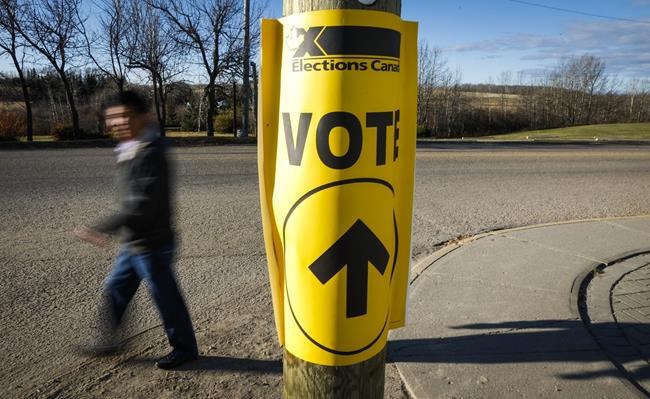‘Do we still have a government?’: Answers to some campaign-related questions
Advertisement
Read this article for free:
or
Already have an account? Log in here »
To continue reading, please subscribe:
Monthly Digital Subscription
$0 for the first 4 weeks*
- Enjoy unlimited reading on winnipegfreepress.com
- Read the E-Edition, our digital replica newspaper
- Access News Break, our award-winning app
- Play interactive puzzles
*No charge for 4 weeks then price increases to the regular rate of $19.00 plus GST every four weeks. Offer available to new and qualified returning subscribers only. Cancel any time.
Monthly Digital Subscription
$4.75/week*
- Enjoy unlimited reading on winnipegfreepress.com
- Read the E-Edition, our digital replica newspaper
- Access News Break, our award-winning app
- Play interactive puzzles
*Billed as $19 plus GST every four weeks. Cancel any time.
To continue reading, please subscribe:
Add Free Press access to your Brandon Sun subscription for only an additional
$1 for the first 4 weeks*
*Your next subscription payment will increase by $1.00 and you will be charged $16.99 plus GST for four weeks. After four weeks, your payment will increase to $23.99 plus GST every four weeks.
Read unlimited articles for free today:
or
Already have an account? Log in here »
Hey there, time traveller!
This article was published 11/09/2019 (2286 days ago), so information in it may no longer be current.
OTTAWA – Welcome to the official start of the federal election campaign, which comes with some obvious questions about party promises and platforms, but also some others that seem to come up each time the country votes.
What is a writ and why does it drop? A writ is a formal order by the chief electoral officer to the army of returning officers in each riding essentially saying that it’s time to hold an election. It isn’t what the prime minister gives to the Governor General to dissolve Parliament and trigger an election — that is called an “instrument of advice.” Nor is it what the Governor General signs to dissolve Parliament — that would be a trio of orders that dissolve Parliament and ask the chief electoral officer to issue writs.
At no point in this process does a writ literally drop, unless one of the 338 issued, one for each riding, slips out of somebody’s hand, but the shorthand gets used nonetheless. It’s thought to have come from the expression “draw up the writs.”

Does Canada still have a government when Parliament is dissolved? Is the prime minister still the one in charge? Yes and yes. In today’s case, Justin Trudeau is still prime minister and the cabinet can still govern — albeit with some restraint. The country’s “caretaker convention” requires it not to make major decisions because there is no House of Commons to hold it accountable.
Even if a minister is defeated in the election, he or she remains a minister until new ministers are sworn in. In fact, all ministers remain in place even if their party is defeated in the election — it is only when the prime minister tenders his or her resignation to the Governor General that ministers cease to hold office.
What happens in a national emergency? The government has the authority to make decisions on issues deemed “urgent and in the public interest,” according to a guide to the election period prepared by the Privy Council Office in 2015. Though if an emergency, such as a natural disaster, took place during the campaign, the Liberals might consult with the other parties “particularly where a major decision could be controversial or difficult for a new government to reverse.”
Once Parliament is dissolved for an election, is there such a thing as an incumbent MP? The Library of Parliament notes that “legally speaking,” there are no members of Parliament after dissolution. Still, MPs are deemed to be MPs until the date of the election. A similar rule applies to the Speaker of the House of Commons, their deputies and MPs on the Board of Internal Economy, which oversees the administration of the House of Commons, until the newly elected chamber gathers and anoints their replacements.
If I have a federal issue, such as a passport problem, can I go to my local MP? Yes. MPs’ offices in Ottawa and in their constituencies remain open and staffed during election campaigns to provide services. But no one who works there can do campaign work, unless it’s after the office closes for the day.
Is there anything my local MP cannot do during the campaign? There is one thing of note: They can’t go to citizenship ceremonies. Neither incumbent MPs nor nominated candidates are allowed to attend the ceremonies that can be popular spots for politicians to meet new voters.
Wasn’t there something in 2015 about suspended senators? Is that a thing this time? The Senate suspended Ontario senator Lynn Beyak without pay in May over her refusal to delete derogatory letters about Indigenous people from her website. Once Parliament is dissolved, Beyak starts getting paid again. She can retake her seat in the Senate once Parliament is recalled after the Oct. 21 vote — at which time senators can consider whether to re-institute her suspension from the upper chamber.


